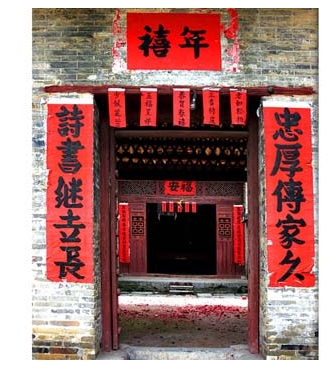
On the Chinese New Year, families in China decorate their front doors with poetic couplets of calligraphy written with fragrant India ink, expressing the feeling of life's renewal and the return of spring.

It is said that spring couplets originated from "peach wood charms," door gods painted on wood charms in earlier times. During the Five Dynasties Period (907-960), the Emperor Meng Chang inscribed an inspired couplet on a peach slat, beginning a custom that gradually evolved into today's popular custom of displaying spring couplets.

In addition to pasting couplets on both sides and above the main door, it is also common to hang calligraphic writing of the Chinese characters for "spring," "wealth," and "blessing." Some people will even invert the drawings of blessing since the Chinese for "inverted" is a homonym in Chinese for "arrive," thus signifying that spring, wealth, or blessing has arrived.





